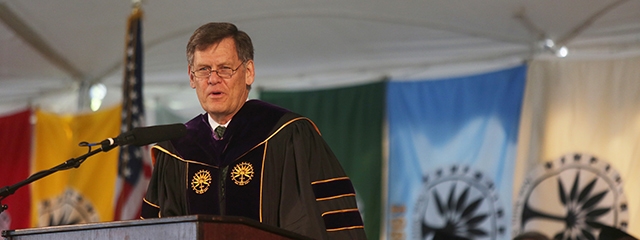Hampshire College President Jonathan Lash recently blogged for the Huffington Post on lifelong learning.
A recent conversation with my wife, a career elementary school teacher, gave me a new way to think about lifelong learning.
I had pictured students at this moment, excited to keep learning, questioning, and creating ideas in response to the rapid change they will face in the future. And of course equipped with skills to put those ideas into action for the common good. It’s a great vision, but she challenged my higher ed assumptions. I had been thinking of lifelong learning almost as a form of adult education.
Briefly, what Ellie described was a writing program for elementary age children that meets at a local theater. She witnessed a gifted teacher framing material, in this case a film the group watched, as reflective of each child’s experiences and budding intellectual interests. He drew them out, one by one, encouraging each learner’s observations and reflections as they brought their own emerging self-awareness to bear on the film’s content.
Although their questions and the level of content were different, I agreed that the process she described did indeed evoke comparisons with the way our college students learn at Hampshire. The same can be said of other progressive education programs in our community, including an early childhood learning center located on our campus that uses the Reggio Emilia approach. Children’s interests and curiosity greatly influence the design of a fluid curriculum that can be adapted as they delve more deeply into activities and need to learn more about a particular subject. Their teachers are responsive and supportive partners in creating the best possible learning environment.
I simply hadn’t thought in quite this way about programs for younger learners, absorbed as I am in the day-to-day demands of a college. However, when you place the focus where it belongs — on the learner — it’s clear that lifelong learning is not from this moment forward, but throughout the life, from cradle-to-grave, as they say. Ellie’s anecdote brought me to a big question:
What responsibility does “higher” education have to other age groups, in particular to elementary, middle, and high school students?
The question reframes the relationship of educators across age groups into one of colleagues engaged in the same work at different times in the learner’s life. How our students learned to learn and the foundations they built earlier shape their college experiences, including the important matter of what kind of college they expect to attend and what institutional mission attracts them. (Here, I’ll assume those young learners Ellie watched are future Hampshire students.) In turn, colleges produce the teachers, administrators, and other educators and caregivers that can positively shape learners’ earlier experiences, which will become their later expectations and skills.
For educators in elementary and secondary school: Those of us in colleges and universities get your outcomes, and you get our outcomes. Bottom line, when the student is the true focus, we’re all partners in the same endeavor. We’re all responsible to the learner, and to one another, and it’s an ongoing process.
As educators, our role is to start where students are and take them as far as we can. The youngest start out so eager and excited about everything. What I experience every day shows me that given the opportunity many will remain so into college and beyond. All of us working together can help ensure that this happens. I plan to talk more about this in my next post.






